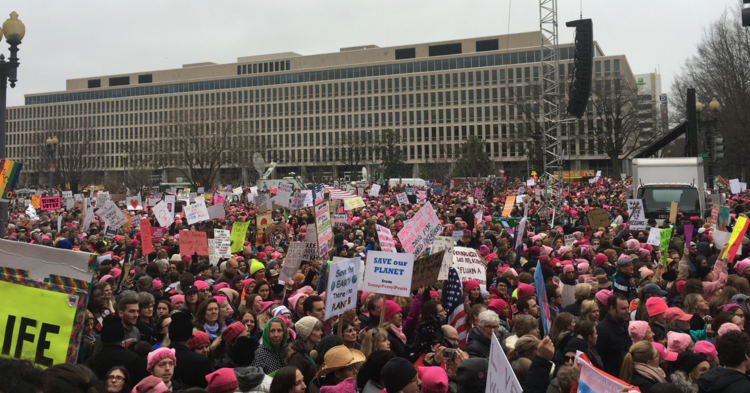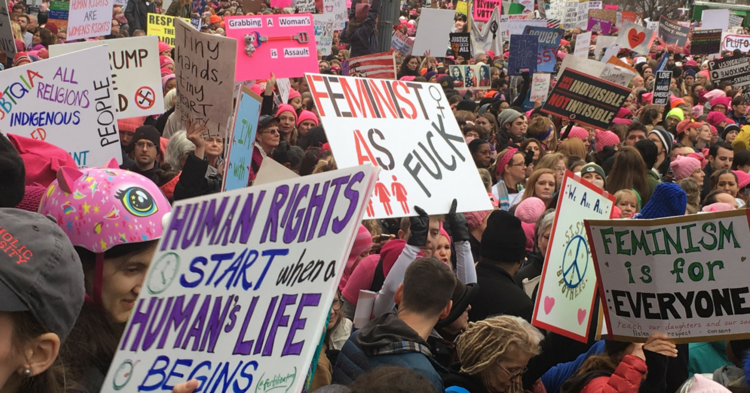The Women Who Didn’t March

By J.D. ECARMA
Photos courtesy of KATE BRYAN
A few days before the historic Women’s March on Washington, organizers decided to cut the partnership of New Wave Feminists, a Dallas-based nonprofit comprising women who identify as feminists and are pro-life.
The move was unsurprising, given that the march had partially been organized in reaction to an incoming president who during his campaign had dangled the carrot of overturning Roe v. Wade in front of conservative voters, alarming pro-choice advocates. But it was still a disappointment to pro-life women who call themselves feminists—another reminder that they are not welcome.
Our statement regarding press today: pic.twitter.com/z1y9cfFFvY
— Women's March (@womensmarch) January 16, 2017
Billed as counterprogramming for inauguration weekend, the march was made up of women who came from across the country to make their voices heard. The event inspired solidarity marches in New York, Chicago and Los Angeles as well as cities around the world. The sheer number of women who turned out to protest put the march in the history books—Nate Silver at FiveThirtyEight estimates some 3 million people across the country, making it one of the largest mass protests in U.S. history.
But I wasn’t one of them, and I had a very specific reason for refraining.
I—along with many other conservative, libertarian and moderate women—have loudly and insistently opposed Donald Trump because of his racism, his cruelty, his frequent and unabashed lies, his record of cheating people, and his love for demeaning women (and his boasts about assaulting them), as well as for his sheer lack of knowledge about how our government works.
I am also pro-life.
I had many reasons to be part of the Women’s March on Washington, to advocate for women and to protest someone who was elected president after a lifetime of treating them “like shit.” But after organizers made it clear that their version of diversity didn’t include pro-life viewpoints, I felt that participating would be a compromise of my beliefs. (As is clear from the pictures, Some pro-life women did choose to march anyway, and I respect their decision even though it wasn’t the one I made.)

I’m worried about our country and the deep division that I see. I’m worried that voices like mine will be marginalized and silenced on both the left and the right as America becomes an even more polarized nation. The decision of the Women’s March to be explicitly pro-abortion was the wrong one to make. Now, more than ever, you need people who are willing to ignore party lines in order to bridge the gap.
The good news is that every day, I rediscover that I’m far from the only one trying to build those bridges. While struggling to make sense of my complicated feelings toward the Women’s March, I reached out to some women who could empathize with my frustration*. Each of us is trying to reclaim feminism in her own way, and I hope the next time a movement of women wants to make a historic statement, we will be welcome to join.
Amanda Elliott, Arlington, Va.
“I decided not to march first and foremost because I generally don’t align myself with a movement that preaches empathy and then turns its back on pro-life women. I wasn’t surprised by the move, but I also wasn’t about to shove my convictions to the side for what would have been on my part, a fake display of unity.
I also decided not to participate because of what I see as the obvious disconnect: Marching for the sole purpose of putting on a public show of ‘unity’ is no substitute for real action. It’s just not. When I commit to any form of activism, it’s based on something deeper than shallow platitudes and identity politics.”

Claire Swinarski, Brookfield, Wis.
“I was upset, but not at all surprised to see the Women’s March organizers cut a pro-life sponsor. At the end of the day, pro-life feminists aren’t really welcome anywhere. Many Christians don’t want us because they don’t understand the meaning of feminism, and most feminists don’t want us because they don’t understand our views on abortion. It was sad, but throughout history, whenever people stuck up for the most vulnerable, they were widely rejected by society. I doubt that will ever change.
I absolutely empathized with the sentiments of those marching. The fact that our elected president has said such horrible things about women is disgusting. The rape culture we live in every day affects many women. I personally don’t feel very affected by things like Trump’s statements—I prefer to just roll my eyes—but I’m privileged enough to be in that position due to my skin color, economic status, and the fact that I’ve never been a victim of assault. I completely agree with a peaceful protest against what Trump has said. I’d also really like to see the US get with the rest of the world when it comes to paid parental leave, which I’m guessing is unlikely to happen with the new administration.
However, where I disagree obviously lies in abortion. Planned Parenthood, which so many of these women would step in front of a train for, doesn’t do mammograms. They don’t offer prenatal care. They don’t offer adoption counseling. They sell abortions. It’s been proven again and again, but people would rather stick to rhetoric (‘low-income women will DIE!’) then actually look at facts. Planned Parenthood lobbied against a bill that would have prevented gender-selection abortion. They’re obviously not for women. When Abby Johnson, a pro-life advocate, attended the march while pregnant, she mentioned people kept saying ‘Oh, wonderful! Babies!’ Part of her felt like, really? I thought you thought they were just a ‘clump of cells.’”

Courtesy of Pixabay
Cecelia Stokes, Greenville, S.C.
“Advocacy is the heart of both prolife and feminist rhetorics—speaking on behalf of the oppressed and the voiceless, which is why being a prolife feminist is far from an oxymoron. I want to believe that the purpose of the women’s march was to give voice to the oppressed, but in the process, they oppressed voices that didn’t speak to a particular agenda.
It hurts me to see feminists equate reproductive rights with human rights because it seems to reinforce the idea that our genitals are our whole identity, which is a concept feminism has worked hard to end. In excluding pro-lifers from participating, the March contradicted its message of equality of value for all people and, practically speaking, limited equality only to those outside the womb who believe in the right to end the life of those inside the womb.”
Katherine Beard, New York, N.Y.
“I personally love the idea of people around the nation and even around the world showing solidarity like many suggested they did during the Women’s March on Jan. 21. And yet for these marches that saw millions of feminists pronouncing were an exclusionary group despite their claims. This women’s march was a march for women … Yes, but not all women. It was a march for women who were pro-choice, anti- Trump, pro-Planned Parenthood. So when you think about it, that is actually a fairly exclusive group. In fact, while this March claimed to be a march for women everywhere, I rarely saw signs representing women who had different opinions than the ones mentioned above.
Another thing I find interesting is that while these marches were supposed to be empowering for females they were triggered and inspired by a man … Donald Trump. We are legitimizing him rather then letting womanhood stand on its own two feet. We are making feminism a bullet point rather than letting it stand alone as its own worthwhile issue. And last but not least, I agree that there are still cases in America where women are not completely treated as equals. However, I also realize my privilege living in this country where in most cases I am treated as an equal to a man. If this so-called ‘Women’s March’ were truly about women (all women) why were there not more signs recognizing the plights and frustrations that women all over the world face?”

“There are a myriad of universal women’s issues that could have been highlighted at this so called Women’s March, and yet they were not. In fact, some pro-life groups were even banned from participating. How can an event be called a ‘Women’s March’ (which implies that all women are invited) when only certain women with certain opinions and agendas are allowed to participate? It seems dishonest to call these marches a women’s march when it excludes so many women who would of otherwise love to have shown their solidarity. How can this be called a ‘women’s march’ when it encourages the extermination of future feminists who aren’t fully formed yet, but who could join this sisterhood 30 years from now, if they were only given a chance to be born?”
*Some of the quotes have been edited for clarity and length.



